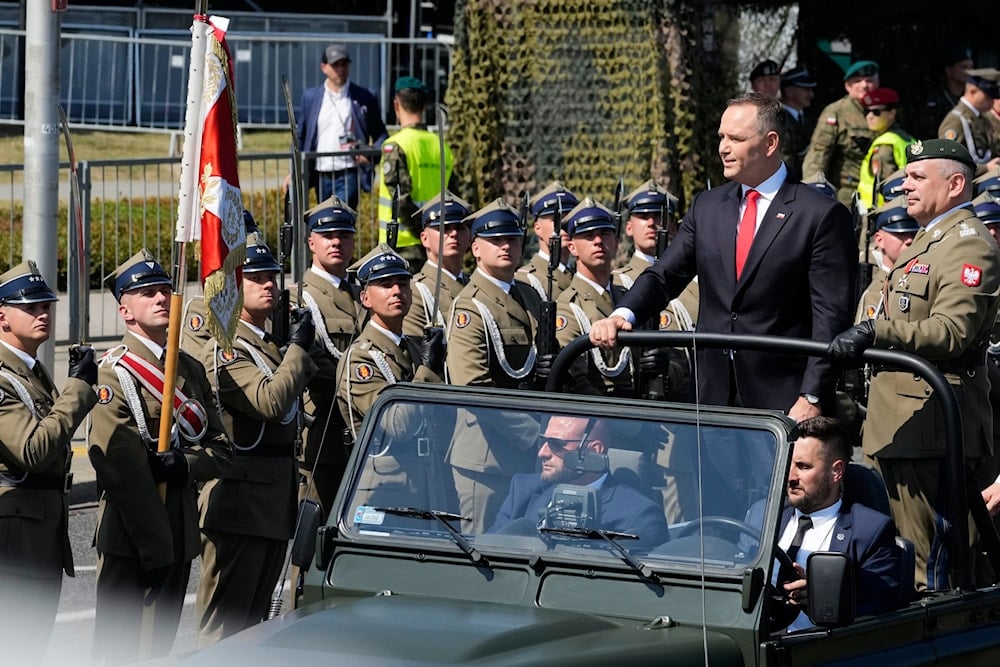Poland vetoes refugee benefits, deepening rift with Ukraine
Polish President Karol Nawrocki vetoes a bill to extend refugee benefits, limiting aid for Ukrainians and sparking criticism from Prime Minister Donald Tusk.
-

Newly sworn-in Polish President Karol Nawrocki, Commander-in-Chief of the Polish Armed Forces, leads the Armed Forces Day commemorations in Warsaw, Poland, Friday, August 15, 2025. (AP Photo/Czarek Sokolowski)
Polish President Karol Nawrocki has vetoed legislation that would have prolonged welfare benefits for Ukrainian refugees. Nawrocki, who assumed office earlier this month, argued that financial support should be limited to Ukrainians who are employed in Poland.
“We remain open to providing assistance to Ukrainian citizens, that hasn’t changed. But after three and a half years, our law should be amended,” he said in a statement.
The bill, which had aimed to extend child benefit payments of 800 złoty ($219) per month until March 2026, will now expire at the end of September. Approximately 1.5 million Ukrainians currently reside in Poland, most of them women and children.
Under Nawrocki’s proposed "work for welfare" framework, family benefits and healthcare access would be tied directly to employment status.
The president's veto has wider consequences, particularly for Ukraine’s communications infrastructure. Deputy Prime Minister Krzysztof Gawkowski warned that Poland’s financing of Starlink satellite internet services could be jeopardized, calling the veto “the end of Starlink internet, which Poland provides to Ukraine during its conflict.”
Between 2022 and 2024, Poland invested about $83.5 million in 24,500 Starlink terminals, with an additional $20 million earmarked for 2025. However, this funding framework expires on September 30, potentially leaving Ukrainian military and civilian networks exposed.
Nawrocki’s office has signaled that Starlink payments could continue if parliament adopts an alternative presidential bill before the deadline.
Political rift between president and prime minister
The veto has deepened the political divide in Warsaw. Prime Minister Donald Tusk sharply criticized the move, with Labor Minister Agnieszka Dziemianowicz-Bąk writing on X, “We cannot punish people for losing their job, particularly not innocent children. This is the ABC of human decency.”
800 plus to pieniądze dla i na dzieci. Dzieci, które nie odpowiadają za to, czy ich mama ma pracę, czy właśnie ją straciła, czy opiekuje się chorą babcią albo noworodkiem.
— A. Dziemianowicz-Bąk (@AgaBak) August 25, 2025
Pracę należy doceniać. Po utracie pracy trzeba zachęcać i pomagać w znalezieniu nowej. Ale za utratę pracy…
The standoff reflects a broader deadlock between the presidency and parliament. Tusk’s government lacks the two-thirds majority needed to override Nawrocki’s vetoes, while the president has the power to block government initiatives. This balance of power has stalled policymaking on Ukraine at a critical moment.
Additionally, Nawrocki announced plans to amend the Polish criminal code to outlaw the display of symbols linked to Stepan Bandera, the Ukrainian nationalist leader. The proposal seeks to equate “Bandera symbols” with Nazi and Soviet imagery already banned under Polish law, accompanied by the slogan: “stop Banderism.”
The issue touches on sensitive historical wounds, particularly the Volhynia massacres of 1943–1945, in which tens of thousands of Polish civilians were killed by the Ukrainian Insurgent Army. While Warsaw views Bandera as a figure associated with atrocities, many Ukrainians regard him as a symbol of resistance against both Nazi and Soviet domination.
Ukrainian diplomats have warned that such legislation could spark “stronger negative sentiment in Ukrainian society” and force an official response.
Public attitudes in Poland have shifted significantly since the early days of the Russia-Ukraine war, when millions of Poles opened their homes to refugees.
Bartosz Cichocki, Poland’s former ambassador to Ukraine, described the shift as inevitable. “After the euphoric solidarity in 2022, the climax of social and political support, there had to be some sort of swing to the other side. We are now in this other extreme. I believe at some point this will calm down and we will reach a balanced approach,” he said.

 3 Min Read
3 Min Read










